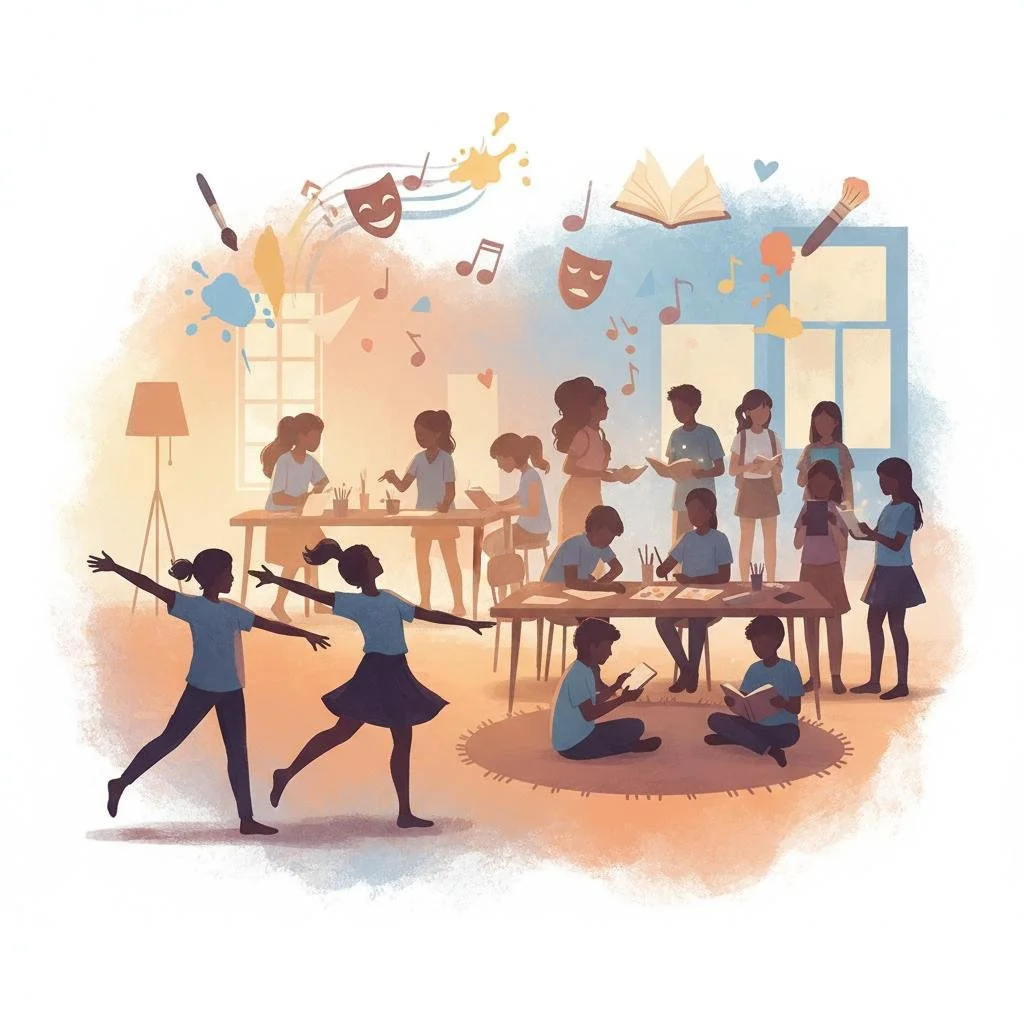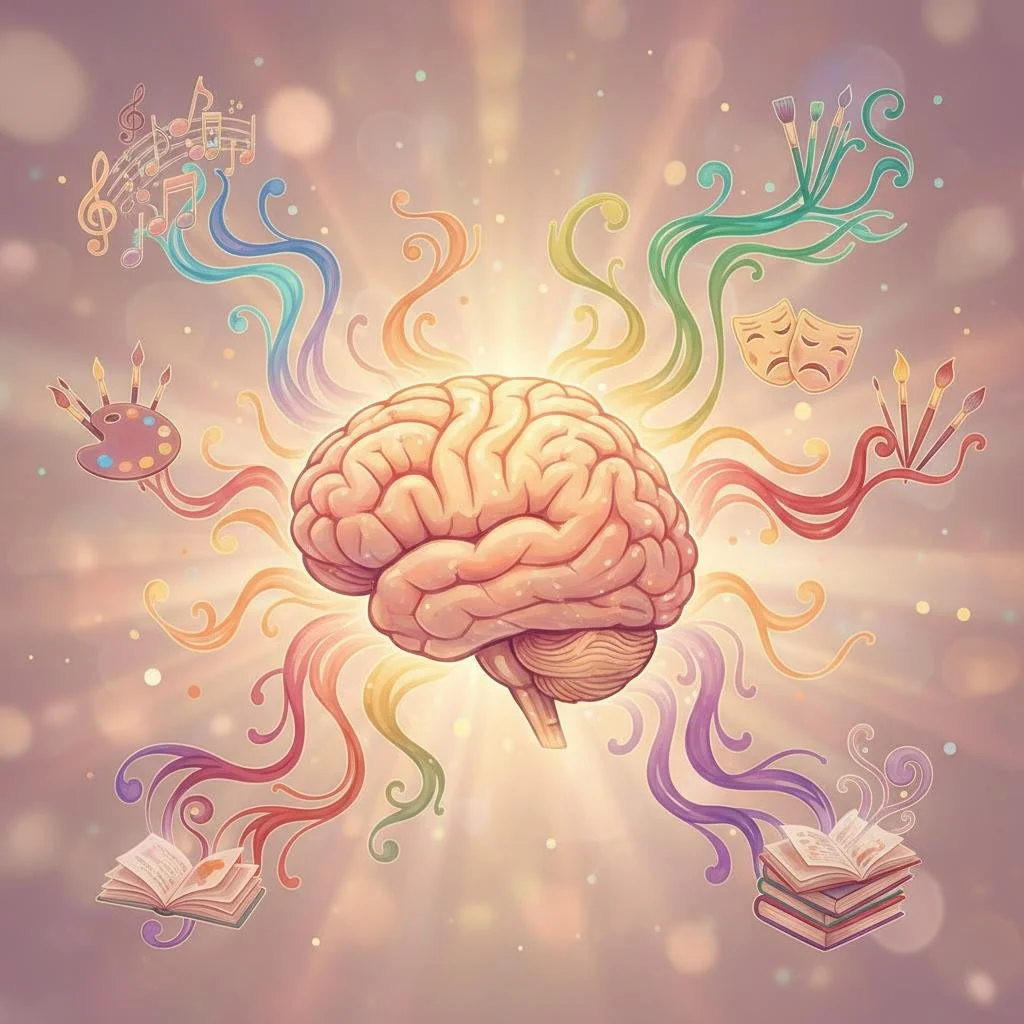Celebrating Neurodiversity in the Arts: How Theatre Transforms Lives for Every Child
At Up-Stage Theatre Arts, we've witnessed countless moments of magic – not just on our stage, but in the hearts and minds of the children we support. Today, we want to share why the arts, particularly drama, can be transformational for neurodiverse children, and how our inclusive approach creates a space where every child can truly shine.
Understanding Neurodiversity: More Than Just a Buzzword
Neurodiversity encompasses the natural variations in how our brains work – including autism, ADHD, dyslexia, and other neurological differences. Rather than viewing these as deficits, we celebrate them as different ways of experiencing and interpreting the world.
Dr. Ari Ne'eman, a leading autism advocate and researcher, explains: "Neurodiversity is about recognising that neurological differences are natural variations that should be respected and accommodated, rather than pathologised or cured."
At Up-Stage, we've seen this philosophy come to life countless times. Children who struggle in traditional classroom settings often discover their unique strengths through drama – whether it's the child with autism who memorises entire scripts effortlessly, or the young person with ADHD whose boundless energy becomes the perfect fuel for physical theatre.
The Science Behind Arts and Neurodiversity
Research consistently shows that creative arts provide unique benefits for neurodiverse individuals. A 2023 study published in Arts & Health found that drama therapy significantly improved social communication skills in autistic children, whilst also reducing anxiety levels.
Dr. Sarah Johnson, a specialist in developmental psychology at the University of Cambridge, notes: "The arts provide a structured yet flexible environment where neurodiverse children can explore social situations safely, develop emotional regulation skills, and build confidence at their own pace."
This aligns perfectly with what we observe in our sessions at Barton-le-Clay Village Hall. Drama naturally incorporates:
Predictable routines that provide comfort for children who thrive on structure
Sensory experiences that can be adapted to individual needs
Social skills practice in a supportive, non-judgmental environment
Emotional expression through character work and storytelling
The Up-Stage Difference: Inclusion in Action
Our approach isn't just about accepting neurodiverse children – it's about creating an environment where their unique perspectives enhance everyone's experience. Here's how we make it work:
No Auditions, No Exclusions
Every child who walks through our doors is welcome, regardless of ability, confidence level, or support needs. This isn't just policy – it's our core belief that every young person has something valuable to contribute.
Individualised Support
Our practitioners, led by Keith Badham (a qualified Mental Health First Aider), create personalised schemes of work. If a child needs to step out during overwhelming moments, that's perfectly fine. If someone learns differently, we adapt our teaching methods accordingly.
Sensory Considerations
We understand that bright lights, loud sounds, or unexpected physical contact can be challenging. Our sessions are designed with sensory needs in mind, and we always provide alternatives for children who need them.
Celebrating Different Communication Styles
Some of our young people communicate through movement, others through art, and some prefer written expression. We've learned that communication comes in many forms, and each one is valid and valuable.
Real Benefits We've Witnessed
Over nearly two decades, we've seen remarkable transformations:
Building Confidence: Children who barely spoke when they first arrived have gone on to perform solos with pride. The structured nature of drama provides a safe framework for taking risks and trying new things.
Developing Social Skills: Through character work and ensemble pieces, young people naturally practise turn-taking, cooperation, and empathy – all whilst having fun rather than feeling pressured.
Emotional Regulation: Drama provides healthy outlets for big emotions. Whether it's channelling frustration into a villain's monologue or expressing joy through movement, the arts give children tools for emotional expression.
Sensory Integration: Many of our activities naturally incorporate sensory experiences in positive ways – from the texture of costumes to the rhythm of vocal warm-ups.
Expert Insights: Why Theatre Works
Leading drama therapist Dr. Phil Jones explains: "Theatre provides a unique combination of structure and creativity that particularly benefits neurodiverse individuals. The 'as if' quality of drama allows children to explore different aspects of themselves and practice social situations without real-world consequences."
This resonates deeply with our experience. We've watched children with social anxiety blossom when they can 'be' someone else on stage, and seen young people with autism discover their exceptional memory skills through script work.
Occupational therapist and autism specialist Dr. Temple Grandin advocates for arts education, stating: "The arts can provide neurodiverse individuals with career paths that utilise their unique strengths whilst building essential life skills."
Creating Inclusive Spaces: What Really Matters
Based on our experience and current research, here are the key elements that make arts programmes truly inclusive:
Flexibility Over Rigidity: Whilst structure is important, the ability to adapt and modify activities is crucial. Some days, a child might need to observe rather than participate actively – and that's perfectly valid.
Strength-Based Approach: Instead of focusing on what children can't do, we celebrate what they can do brilliantly. Every child has unique talents waiting to be discovered.
Patience and Understanding: Building trust takes time. We've learned that some of our most remarkable breakthroughs happen months or even years into a child's journey with us.
Family Partnership: Working closely with parents and carers ensures consistency and helps us understand each child's individual needs and preferences.
The Ripple Effect: Benefits Beyond the Individual
When we create truly inclusive spaces, everyone benefits. Neurotypical children develop empathy, patience, and appreciation for different perspectives. They learn that there are many ways to be successful and that diversity strengthens our community.
As autism advocate and researcher Dr. Michelle Dawson notes: "When we accommodate neurodiversity, we create environments that are better for everyone – more flexible, more understanding, and more innovative."
Looking Forward: A More Inclusive Future
The conversation around neurodiversity is evolving rapidly, and we're excited to be part of that change. Recent research from the National Autistic Society shows that with proper support, neurodiverse individuals can achieve remarkable things in creative fields.
At Up-Stage, we're committed to continuing our learning journey. We regularly update our practices based on new research and, most importantly, feedback from the young people and families we support.
Your Child's Journey Starts Here
If you're a parent wondering whether drama might benefit your neurodiverse child, we'd love to chat. Every child's journey is unique, and we're here to support whatever that looks like for your family.
Remember, there's no such thing as being "not ready" for drama. We meet every child exactly where they are and help them discover their own path to confidence, creativity, and joy.
At Up-Stage Theatre Arts, we believe that every child deserves the chance to shine – not despite their differences, but because of them. Our weekly sessions in Barton-le-Clay welcome children aged 5-16, with no auditions and no exclusions. To learn more about how we can support your child's journey, contact us at keith@up-stage.co.uk or call 07595 053251.




